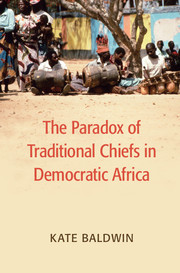The Paradox of Traditional Chiefs in Democratic Africa Cambridge Studies in Comparative Politics Series
Langue : Anglais
Auteur : Baldwin Kate

This book shows that powerful hereditary chiefs do not undermine democracy in Africa but, on some level, facilitate it.
The Paradox of Traditional Chiefs in Democratic Africa shows that unelected traditional leaders can facilitate democratic responsiveness. Ironically, chiefs' undemocratic character gives them a capacity to organize responses to rural problems that elected politicians and state institutions lack. Specifically, chiefs' longer time horizons encourage investment in local institutions that enable the provision of local public goods. This is the paradox of traditional chiefs in democratic Africa: elected politicians can only effectively respond to rural constituents through institutions constructed and maintained by local leaders who are not worried about electoral terms. Furthermore, the critical role played by chiefs in brokering local development projects forces us to reassess how we understand the basis of their political influence during elections. The book examines the effects of traditional leaders on the electoral connection in Africa through a multi-method approach that combines qualitative research, surveys, and experiments, with particular attention to the Zambian case.
Part I. Toward a New Theory of Chiefs: 1. The paradox of chiefs; 2. Conceptualizing chiefs; 3. Traditional leaders and democracy; 4. Chiefs as development brokers; Part II. Chiefs, Development, and Elections in Zambia: 5. Introduction to Zambia; 6. Chiefs and local public goods provision; 7. Electoral king makers; 8. Chiefs and the voter's calculus; Part III. Traditional Leaders in Africa and Beyond: 9. Chiefs and government responsiveness across Africa; 10. Development brokers revisited.
Kate Baldwin is Assistant Professor of Political Science at Yale University, Connecticut. She has conducted field research in Ghana, Liberia, Sierra Leone, Zambia, and Zimbabwe. Her work has been published in leading journals in political science, including the American Political Science Review, the American Journal of Political Science, World Politics, and Comparative Politics. An article based on the research in this book won the award for the best article published in the American Journal of Political Science.
Date de parution : 11-2015
Ouvrage de 253 p.
15.2x22.8 cm
Date de parution : 11-2015
Ouvrage de 260 p.
15.2x22.9 cm
Thème de The Paradox of Traditional Chiefs in Democratic Africa :
© 2024 LAVOISIER S.A.S.



